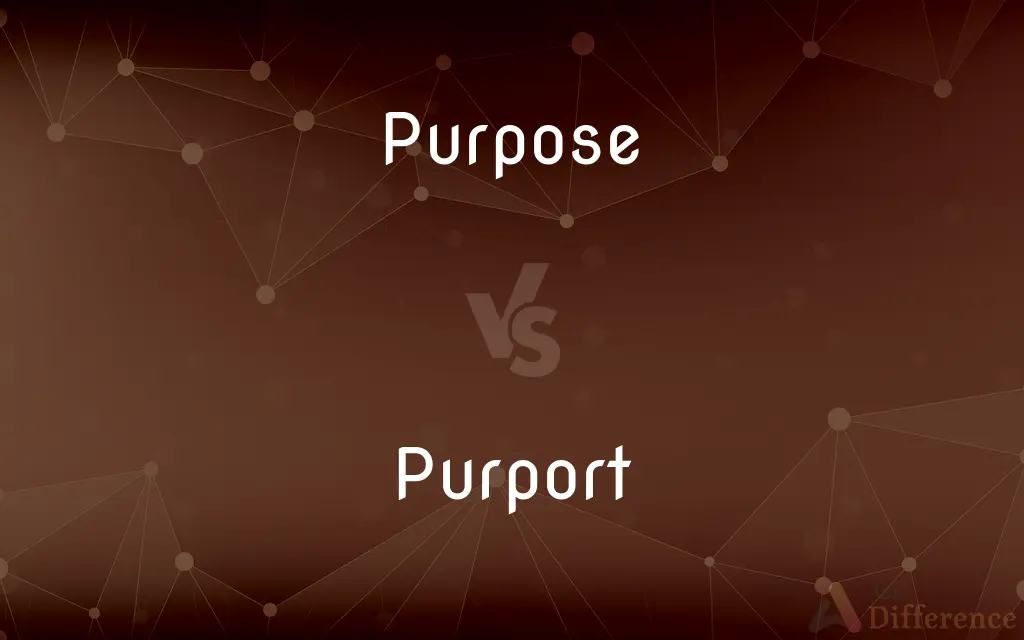Purpose vs. Purport — What's the Difference?
By Fiza Rafique & Maham Liaqat — Updated on April 1, 2024
Purpose refers to the reason behind an action or the intended goal, focusing on objectives, while purport is about the claimed or apparent meaning, often implying a suggestion rather than explicit statement.

Difference Between Purpose and Purport
Table of Contents
ADVERTISEMENT
Key Differences
Purpose signifies the intention or objective behind an action, decision, or creation. It encapsulates the goals or aims that individuals, groups, or objects are meant to achieve. This concept is central to understanding motivations and planning outcomes in various contexts, from personal ambitions to the design of objects. On the other hand, purport relates to what something is said, claimed, or thought to signify or mean. It often carries an implication or suggestion, sometimes without direct evidence or clear statement, and can be used to describe the apparent intentions or meanings conveyed by words, actions, or appearances.
The term purpose is used widely to denote the reason for which something is done or created, or for which something exists. For example, the purpose of a knife is to cut, and the purpose of a study might be to discover new information. Purport, however, is often used in legal, literary, and analytical contexts to describe the supposed or claimed meaning or intention behind something, such as the purport of a statement in a document or the purport of an author’s argument.
When discussing purpose, there's often a focus on the practical or intended outcomes of actions and creations. It involves a forward-looking perspective, aiming at achieving specific results or fulfilling certain roles. In contrast, purport usually involves interpretation or speculation about the meaning, intention, or essence of something, which might not be explicitly stated. It's about reading between the lines or inferring intentions from what is presented or claimed.
Understanding the purpose of something provides clarity on its intended use or the goals behind actions. This clarity can guide decision-making and behavior. Understanding the purport of something, however, requires analytical skills to interpret or infer the intended or suggested meanings behind what is explicitly presented, which can be crucial in communication, legal interpretations, and critical analysis.
The distinction between purpose and purport is especially important in contexts where intentions, meanings, and outcomes are analyzed or debated. Knowing an object's purpose can inform its design and use, while understanding the purport of statements or actions can influence interpretations and responses in complex social, legal, or personal scenarios.
ADVERTISEMENT
Comparison Chart
Definition
The reason for which something is done or created.
The claimed or apparent meaning or intention.
Contexts
Broadly used in everyday, professional, and academic contexts.
Often found in legal, literary, and analytical discussions.
Focus
On intentions and objectives.
On interpretation or suggested meanings.
Usage
To denote intended goals or aims.
To describe supposed or claimed meanings or intentions.
Outcome
Clarity on intended use or goals.
Inference or speculation about meanings or intentions.
Compare with Definitions
Purpose
The reason something exists or is done.
The purpose of the meeting was to discuss company goals.
Purport
Supposed intention behind words or actions.
The purport of her actions was to undermine his authority.
Purpose
Desired outcome.
The purpose of this exercise is to build team cohesion.
Purport
Claimed or implied meaning.
The purport of his remark was unclear but seemed critical.
Purpose
Function or role.
The purpose of a hammer is to drive nails.
Purport
Apparent intention or claim, often without proof.
The purport of the advertisement was to suggest luxury.
Purpose
Intended goal or aim.
His purpose in studying hard is to get into a good university.
Purport
Suggested significance or essence.
The purport of the novel is the resilience of human spirit.
Purpose
Objective behind an action.
The purpose of her speech was to inspire the graduates.
Purport
Conveyed or implied message.
The letter’s purport was reassuring, though not explicitly so.
Purpose
The object toward which one strives or for which something exists; an aim or goal
Her purpose in coming here is to talk to you. The purpose of an airliner is to transport people.
Purport
To have or present the often false appearance of being or intending; claim or profess
A novel that purports to be a sailor's memoir.
An author who purports to have witnessed the events.
Purpose
Determination; resolution
He was a man of purpose.
Purport
Meaning that is presented, intended, or implied; import.
Purpose
To intend or resolve
"the gap between what is said and what is purposed" (Ian Donaldson).
Purport
Intention; purpose
The purport of the visit was to discuss trade relations.
Purpose
The end for which something is done, is made or exists.
What is the purpose of your visit?
My purpose in coming to Egypt was simply to take it en route to the desert.
It has been my purpose to illustrate rather than to explain.
The exceptionally small gate-leg table served the purpose of a tea table admirably.
The purpose of the device is to prevent the breechblock from opening accidentally should the gun be held barrel down.
The purpose of this letter is to set the record straight.
The purpose of this book is to study the interrelationship of government and religion.
The device can be used for both civilian and military purposes.
The purpose of turning off the lights overnight is to save energy.
Purport
To convey, imply, or profess (often falsely or inaccurately).
He purports himself to be an international man of affairs.
Purpose
Function, role.
Purport
(construed with to) To intend.
He purported to become an international man of affairs.
Purpose
(Sense of having a) meaning for existing or doing something.
Purport
Import, intention or purpose
Purpose
Resolution; determination.
Purport
(obsolete) disguise; covering
Purpose
(obsolete) The subject of discourse; the point at issue.
Purport
Design or tendency; meaning; import; tenor.
The whole scope and purport of that dialogue. Norris.With a look so piteous in purportAs if he had been loosed out of hell.
Purpose
(transitive) To have or set as one's purpose or aim; resolve to accomplish; intend; plan.
Purport
To intend to show; to intend; to mean; to signify; to import; - often with an object clause or infinitive.
They in most grave and solemn wise unfoldedMatter which little purported.
Purpose
(intransitive) To have (an) intention, purpose, or design; to intend; to mean.
Purport
The intended meaning of a communication
Purpose
To discourse.
Purport
General meaning or tenor;
Caught the drift of the conversation
Purpose
That which a person sets before himself as an object to be reached or accomplished; the end or aim to which the view is directed in any plan, measure, or exertion; view; aim; design; intention; plan.
He will his firste purpos modify.
As my eternal purpose hath decreed.
The flighty purpose never is o'ertookUnless the deed go with it.
Purport
Have the often specious appearance of being, intending, or claiming;
The letter purports to express people's opinion
Purpose
Proposal to another; discourse.
Purport
Propose or intend;
I aim to arrive at noon
Purpose
Instance; example.
Purpose
To set forth; to bring forward.
Purpose
To propose, as an aim, to one's self; to determine upon, as some end or object to be accomplished; to intend; to design; to resolve; - often followed by an infinitive or dependent clause.
Did nothing purpose against the state.
I purpose to write the history of England from the accession of King James the Second down to a time which is within the memory of men still living.
Purpose
To have a purpose or intention; to discourse.
Purpose
An anticipated outcome that is intended or that guides your planned actions;
His intent was to provide a new translation
Good intentions are not enough
It was created with the conscious aim of answering immediate needs
He made no secret of his designs
Purpose
What something is used for;
The function of an auger is to bore holes
Ballet is beautiful but what use is it?
Purpose
The quality of being determined to do or achieve something;
His determination showed in his every movement
He is a man of purpose
Purpose
Propose or intend;
I aim to arrive at noon
Purpose
Reach a decision;
He resolved never to drink again
Common Curiosities
Can the purpose and purport of a statement be the same?
In some contexts, they can overlap, especially if the intended purpose of a statement is to convey a specific implied meaning. However, purport often involves interpretation beyond the explicit purpose.
Why is understanding purpose important?
Understanding purpose is crucial for aligning actions with goals, making informed decisions, and achieving desired outcomes effectively.
How is purport used in legal contexts?
In legal contexts, purport can refer to the apparent meaning or claim of a document, statement, or action, often as interpreted in the light of evidence, precedent, and legal principles.
How can the purport of an action differ from its purpose?
The purport of an action can differ from its purpose if the action suggests or implies intentions or meanings that are not explicitly part of the intended goals or objectives.
What is the difference between purpose and purport?
Purpose relates to the intention or goal behind an action or the reason something exists, while purport refers to the claimed or implied meaning or intention behind something, often based on interpretation.
How do you determine the purpose of an action?
Determining purpose usually involves understanding the goals, objectives, or desired outcomes behind the action, which can often be inferred from context or stated intentions.
What skills are necessary to interpret the purport of a text?
Skills in critical thinking, analysis, and an understanding of context are necessary to accurately interpret the purport of a text, especially to infer meanings that are not explicitly stated.
Can something have multiple purposes?
Yes, an object or action can have multiple purposes, serving different goals or fulfilling various functions.
How does culture influence the purport of communications?
Culture can significantly influence the interpretation of messages, with the same words or actions having different implied meanings in different cultural contexts.
Is the purport of a message always intentional?
Not always. Sometimes, the purport of a message can be a result of interpretation that the sender did not intentionally convey.
Share Your Discovery

Previous Comparison
Dwarfen vs. Dwarven
Next Comparison
Mohican vs. MohawkAuthor Spotlight
Written by
Fiza RafiqueFiza Rafique is a skilled content writer at AskDifference.com, where she meticulously refines and enhances written pieces. Drawing from her vast editorial expertise, Fiza ensures clarity, accuracy, and precision in every article. Passionate about language, she continually seeks to elevate the quality of content for readers worldwide.
Co-written by
Maham Liaqat














































